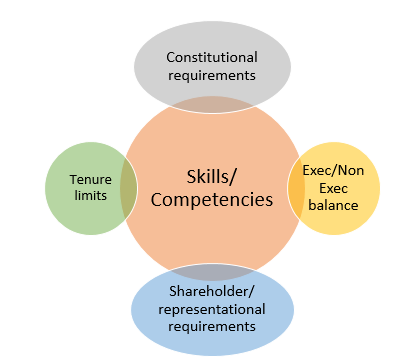There is a science to building a high performing board. Whilst time and effort are spent selecting the right mix of skills for employee teams, sporting teams, project teams and yes, even orchestras; boards are often assembled without much thought. Often vacancies are filled via referrals from within the board or business connections and nominations from member organisations. The result can be a lot like orchestra full of violins – one voice, no diversity and with all the other possible voices benched.
This critical element of board governance is often obscured by avoided conversations about tenure, director performance and competence. It is manifested through poor decision making, lost opportunities and increased risk for the organisation. Management can become frustrated at the lack of relevant skills around the board table and the lost opportunities to capitalise on emerging issues, which has an impact on board/management relations.
Board composition
Board composition varies significantly between organisations and is influenced by an range of factors as shown below. Central to these factors are skills or competencies.
New boards have the advantage in that they can start with a clean slate and plan the required skills before recruitment. More stable boards with long-serving and committed members will have the advantage of a thorough knowledge of the organisation and its mission. However, incumbency can lead to complacency and taking the time to review the organisation’s present and future challenges will assist in identifying the required director skills.
The board skills approach
At Effective Governance we approach board skills by looking at four categories. The first two categories should be required of all existing and potential directors, with governance skills being able to be acquired through a structured professional development program. Technical and industry skills could be covered across the individual directors on a board as there will be a range of skills necessary, depending on the organisation’s activities, present and future needs.
- Behavioural
This category looks at the behavioural attributes that enable directors to contribute to board functionality. It includes the ability to interact with fellow board members, management and stakeholders and the ability to have robust discussions and ask tough questions. It also involves discretion, diplomacy and self-awareness. Another aspect of behavioural competencies is alignment with organisational values and willingness to contribute to the board and committees.
- Governance
Core governance skills are required by all directors. This includes matters such as understanding director responsibilities and duties and demonstrating required corporate governance skills. Being able to identify conflicts and engage in discussions on managing conflicts. A board might consider mandating minimum levels of experience or training in corporate governance.
- Technical
This includes any technical or professional skills or specialist knowledge to assist the board in its decision making. Skills or knowledge across law, human resources, marketing, cyber security or ESG would be included in this category. There may be unique technical skills such a knowing about machinery manufacturing or medical training and this would be for the board to determine when compiling its skills matrix.
- Industry
Experience and knowledge of the industry in which the organisation operates is also essential for a high functioning board. For example, a board might require experience across adult education, agriculture or the financial service sector. There may be a range of industries which the board wishes to have covered within the board and only by deliberately considering these will the board be able to consciously recruit to a skills matrix.
Next steps
Every board, even high functioning boards, will benefit form a skills matrix exercise. The key is to review existing skills on the board and to map these against required skills now and into the future. Effective Governance has extensive experience in conducting skills reviews and frequently assists boards to develop a skills matrix fit for their organisation’s activities. If you’d like to have a conversation on how we can help your board, please contact our Effective Governance team.

